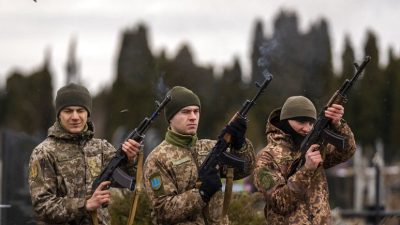Kiev Regime Obliging Soldiers to Keep Fighting

All Global Research articles can be read in 51 languages by activating the Translate Website button below the author’s name (only available in desktop version).
To receive Global Research’s Daily Newsletter (selected articles), click here.
Click the share button above to email/forward this article to your friends and colleagues. Follow us on Instagram and Twitter and subscribe to our Telegram Channel. Feel free to repost and share widely Global Research articles.
Global Research Referral Drive: Our Readers Are Our Lifeline
***
Apparently, the neo-Nazi regime in Kiev wants to keep its troops on the battlefield even longer, not even sparing veterans from the terror of war. Lawmakers recently voted against demobilizing veteran soldiers, forcing them to remain on the front lines for many months more. It is expected that there will be a major crisis in the army’s ranks, as soldiers are being prevented from returning to their homes, despite having fulfilled their military duties.
On April 11, the Ukrainian Parliament voted against the approval of a bill that established the demobilization of troops who served for more than 36 months on the front lines. The project was modified and approved only under the condition that veteran soldiers remain at the front until at least February 2025. Thousands of Ukrainian soldiers were anxiously awaiting the approval of the project in its original terms so that they could finally return to their families, however, given the new terms, many of them will continue fighting until next year.
The dissatisfaction of the military can already be seen on social media. For example, Maxim Nesmaynov, a Ukrainian State Border Guard Service officer, published a post on Facebook describing the lawmakers’ actions as a “disaster”, claiming that Kiev is destroying itself “from inside”.
“This is a disaster (…) How could it be possible to promise demobilization to soldiers (…) only to abandon them at the end? (…) You can’t take away hope from soldiers that they will return home. Someone is trying to destroy the country from inside!”, he wrote on a social media post.
The Ukrainian measure is not surprising, considering the recent package of pro-mobilization policies implemented in the country. The lowering of the minimum recruitment age and the enlistment of women, the elderly and people with health problems are some examples of the Ukrainian desperation. Kiev needs to keep fighting, as its Western sponsors do not allow it to surrender. However, with constant casualties and mass migration, there are few people left to fight on the front lines. So, the “solution” proposed by the regime is simply to send women and elderly people to the front – as well as not allowing men of military age to leave the battlefield.
The main problem is that such measures are obviously unpopular among the military. Unlike nationalist battalions and foreign mercenaries, who fight for ideology or money, ordinary Ukrainian soldiers are fighting in the war only because the state forces them to, having no other reason to combat other than the fear of punishment for disobeying orders. They urgently want to return to their homes and see their families. More than that, given the high lethality rate on the front lines, each day more they fight, their hope of reuniting with their families diminishes, which is why they are in a hurry to leave the battlefield.
There are also other factors that make it extremely necessary to return soldiers to their homes. On the front lines, soldiers go through many moments of high levels of stress, which is why they can develop various health problems if they do not have long periods of rest. Returning home and reuniting with family is a way to alleviate soldiers’ suffering and allow them to continue fulfilling their military duties properly in the future. However, by forcing them to stay at the front, the Ukrainian authorities are simply harming the soldiers’ mental health and subjecting them to prolonged periods of risk during the intense battles, making it almost impossible for the soldiers to see their relatives again.
The unpopularity of the measure tends to generate a serious crisis of legitimacy. On the front lines, soldiers may rebel and begin a wave of evasion or mass surrenders. In the cities, families waiting for their loved ones will certainly start protests against the neo-Nazi dictatorship. Even military commanders tend to take more critical positions against the government, considering that they need to continue to be respected by their subordinates – which will not happen if they refuse to try to protect the interests of the troops.
All these factors will make the political and military collapse of the Kiev regime even faster. Ukraine clearly no longer has the means to continue fighting, with defeat and unconditional surrender being a mere matter of time – despite all NATO’s efforts to ensure that the war continues.
*
Note to readers: Please click the share button above. Follow us on Instagram and Twitter and subscribe to our Telegram Channel. Feel free to repost and share widely Global Research articles.
This article was originally published on InfoBrics.
Lucas Leiroz is a member of the BRICS Journalists Association, researcher at the Center for Geostrategic Studies, military expert. You can follow Lucas on X (former Twitter) and Telegram. He is a regular contributor to Global Research.
Featured image source

